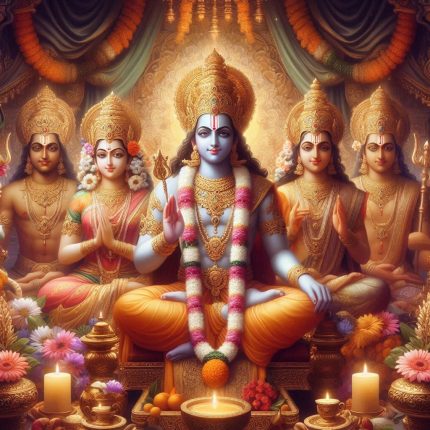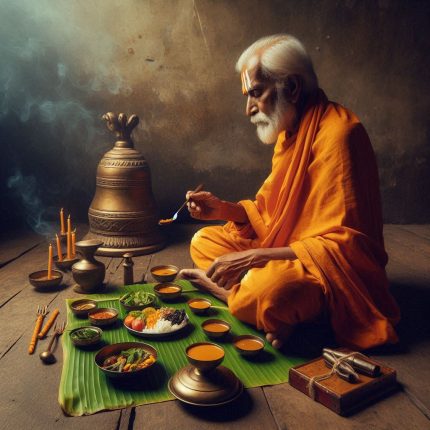Shuddhi Havan: A Ritual for Purification and Peace
Samagri
for Puja:
Haldi [organic] (20gm), Kumkum [organic] (20gm), Tulsi Mala (1), Diya Batti (5), Beetle Nuts (5), Desi Ghee (20ml), Honey (20ml), Jaggery (Gudh) (20gm), Akshata [Yellow rice] (20gm), Yagno-paveetha (5), Karpoora [camphor] (5Tabs), Red/White/Yellow Cloth(1 mtr), Prasad [Laung, Elaichi, Mishri] (20gm), Mouli (25mtr), Ganga Jal (15ml), Durva [fresh] (1), Agarbatti (6)/Dhoop (2), Dakshina (100INR), God Idols (pair), Sambrani (2), Sambrani Holder (1), Kalash [small copper] (1), Panchpatra [small copper] (1), Diya Holder (2), Panchamrit spoon (1), Karpoora Holder(1), includes perishables [Beetle Leaves [fresh] (9), Flowers [fresh] (incl mala), Tulsi [fresh], Mango Leaves [fresh] (7)]
Small Havan:
Cow Dung Cake (2), Mango Wood (250gm), HavanSamagri [20+ Grganic Herbs] (100gm), Ghee (20ml)
Yajman to provide:
Curd (100gm), Milk (100ml), Mithai (250gm), Fruits [5types], Coconut (1), HavanKund, SuchiSarva (Havan Spoon) (1), Kalash [big] (1), Bowl [preferably copper/silver] (1), Spoon [preferably copper/silver] (1), Utensils [2 big Plates (for Aarti/Samagri), disposable Plates, Bowls & Spoons], First solid food (preferably Kheer or Payasam)
Introduction
The Shuddhi Havan, also known as the Shuddhi Homa or Purification Fire Ritual, is a significant Hindu ceremony performed to purify a space, family, or individual following the death of a loved one. This ritual involves making offerings into a sacred fire, invoking divine blessings, and seeking purification and peace. The Shuddhi Havan is an essential part of the death rituals, aiming to restore spiritual balance and remove any negative influences that may affect the living and the departed soul.
Importance and Significance of Shuddhi Havan
The Shuddhi Havan holds deep spiritual and cultural significance:
- Purification: The primary purpose of the Shuddhi Havan is to purify the space and individuals affected by the death. The ritual cleanses any residual negative energy and ensures spiritual clarity.
- Divine Blessings: The ceremony seeks the blessings of deities and divine forces to bring peace, harmony, and protection to the family and the departed soul.
- Cultural Tradition: Performing the Shuddhi Havan upholds important cultural traditions and practices, reflecting the importance of rituals in maintaining spiritual and familial well-being.
- Spiritual Renewal: The ritual restores spiritual balance and provides a sense of renewal, helping the family transition through the period of mourning with a purified and positive outlook.
Benefits of Shuddhi Havan
Participating in the Shuddhi Havan offers several benefits:
- Spiritual Purification: The ritual helps cleanse the space and individuals from any negative influences, promoting spiritual clarity and well-being.
- Peace and Harmony: By invoking divine blessings, the Shuddhi Havan brings peace and harmony to the family and ensures a smooth transition for the departed soul.
- Cultural Continuity: Engaging in traditional practices helps preserve cultural heritage and maintains a connection to ancestral customs.
- Emotional Comfort: The ritual provides emotional support and comfort to family members, helping them navigate the grieving process with renewed spiritual strength.
Occasions to Perform Shuddhi Havan
The Shuddhi Havan is typically performed on specific occasions related to the death:
- Post-Death Rituals: The puja is usually conducted following the death of a loved one, as part of the broader set of death rituals. It helps in purifying the space and individuals after the mourning period.
- Death Anniversary: Some families may perform the Shuddhi Havan on the death anniversary of the departed soul as a mark of continued respect and purification.
- Significant Dates: The ritual may also be performed on other significant dates or during particular family events to restore spiritual balance and ensure positive energy.
Shuddhi Havan Vidhi (Procedure)
The Shuddhi Havan involves several ceremonial steps, each contributing to the ritual’s effectiveness:
- Preparation: The family prepares for the havan by setting up a sacred space, including a fire pit (havan kund) and gathering offerings such as ghee (clarified butter), grains, and sacred herbs.
- Invocation of Deities: The ceremony begins with the invocation of deities and divine forces. The family offers prayers to seek their blessings and ensure a purified and auspicious ritual.
- Lighting the Sacred Fire: The priest lights the sacred fire in the havan kund. The fire represents purity and divine presence, and it is central to the ritual.
- Offering of Ahuti: Offerings (ahuti) such as ghee, grains, and herbs are made into the fire while reciting mantras and prayers. These offerings symbolize the transfer of negative energy and the invocation of divine blessings.
- Recitation of Mantras and Prayers: The priest recites specific mantras and prayers dedicated to purification and peace. The recitation is aimed at invoking divine protection and removing any residual negative influences.
- Aarti and Conclusion: The ritual concludes with aarti (a ritual of offering light) to the deities and divine forces. Family members may also express their personal prayers and gratitude.
Shuddhi Havan Shubh Muhurat
The Shubh Muhurat (auspicious time) for performing the Shuddhi Havan is typically determined based on traditional schedules and astrological considerations. Consulting with a priest or astrologer can help identify the most suitable time for the ritual, ensuring that it aligns with cultural and religious guidelines.
Conclusion
The Shuddhi Havan is a deeply meaningful ritual that plays a vital role in Hindu death ceremonies. By performing this sacred fire ritual, families purify their space and individuals, seek divine blessings, and restore spiritual balance following the death of a loved one. The ritual not only reinforces cultural traditions but also provides a profound way to honour and remember the departed soul, ensuring a spiritually clean and harmonious environment for the living.






